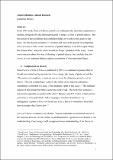Files in this item
Almost identical, almost innocent
Item metadata
| dc.contributor.author | Hawley, Katherine Jane | |
| dc.date.accessioned | 2017-11-16T10:30:06Z | |
| dc.date.available | 2017-11-16T10:30:06Z | |
| dc.date.issued | 2018-07 | |
| dc.identifier.citation | Hawley , K J 2018 , ' Almost identical, almost innocent ' , Philosophy , vol. 82 , pp. 249-263 . https://doi.org/10.1017/S1358246118000097 | en |
| dc.identifier.issn | 0031-8191 | |
| dc.identifier.other | PURE: 251051003 | |
| dc.identifier.other | PURE UUID: 7a7c34ad-049c-44a9-8f20-42678690327a | |
| dc.identifier.other | ORCID: /0000-0002-8179-2550/work/53214469 | |
| dc.identifier.uri | https://hdl.handle.net/10023/12112 | |
| dc.description.abstract | In his 1991 book, Parts of Classes, David Lewis discusses the idea that composition is identity, alongside the idea that mereological overlap is a form of partial identity. But this notion of partial identity does nothing to help Lewis achieve his goals in that book. So why does he mention it? I explore and resolve this puzzle, by comparing Parts of Classes with Lewis’s invocation of partial identity in his 1993 paper ‘Many But Almost One’, where he uses it to address Unger’s problem of the many. I raise some concerns about this way of thinking of partial identity, but conclude that, for Lewis, it is an important defence against accusations of ontological profligacy. | |
| dc.language.iso | eng | |
| dc.relation.ispartof | Philosophy | en |
| dc.rights | © The Royal Institute of Philosophy and the contributors 2018. This work has been made available online in accordance with the publisher’s policies. This is the author created accepted version manuscript following peer review and as such may differ slightly from the final published version. The final published version of this work is available at: https://doi.org/10.1017/S1358246118000097 | en |
| dc.subject | B Philosophy (General) | en |
| dc.subject | T-NDAS | en |
| dc.subject.lcc | B1 | en |
| dc.title | Almost identical, almost innocent | en |
| dc.type | Journal article | en |
| dc.description.version | Postprint | en |
| dc.contributor.institution | University of St Andrews. St Andrews Centre for Exoplanet Science | en |
| dc.contributor.institution | University of St Andrews. Philosophy | en |
| dc.identifier.doi | https://doi.org/10.1017/S1358246118000097 | |
| dc.description.status | Non peer reviewed | en |
| dc.date.embargoedUntil | 2017-11-16 |
This item appears in the following Collection(s)
Items in the St Andrews Research Repository are protected by copyright, with all rights reserved, unless otherwise indicated.

